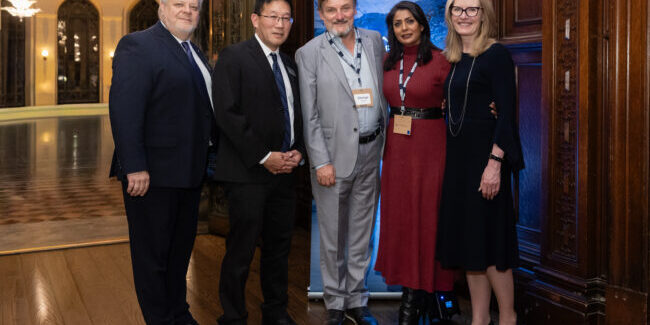Researchers at U of T Engineering’s Institute for Studies in Transdisciplinary Engineering Education & Practice (ISTEP), and its Troost Institute for Leadership Education in Engineering (Troost ILead), have produced a series of award-winning research publications focused on the intersections between leadership, ethics and equity in engineering education.
The team includes Professors Cindy Rottmann (ISTEP, ChemE) and Emily Moore (ISTEP, ChemE), Professor Emeritus Doug Reeve (ChemE) as well as ISTEP Senior Research Associate Andrea Chan and graduate students Dimpho Radebe (IndE 1T4 + PEY, ChemE PhD candidate in EngEd) and Emily Macdonald-Roach (ChemE 2T2, ChemE MASc candidate in EngEd).
“Our focus is understanding how engineers lead and how they learn to lead over the course of their careers while busy doing other things,” says Rottmann.
In their paper What’s Getting in the Way? Personal and Professional Barriers to Engineering Leadership, the team published analysis from a large-scale survey and focus groups with engineers in Ontario. A key finding from the study reveals that while 89% of engineers experiencing barriers to their leadership, the numbers are even higher for racialized men and women, white women and early-career engineers.
“A key objective of our research program is to make implicit patterns of privilege in the profession and society into explicit ones,” says Rottmann.
The paper won best Diversity, Equity, and Inclusion Paper Award for the Engineering Management Division (EMD) at the 2022 American Society for Engineering Education Conference and best EMD presentation at the 2023 conference.
Another paper by this research team — Reifying Dominant Ideologies: Consequences of Decoupling Equity from Ethics in Engineering Education — was awarded Best Paper at the Institute of Electrical and Electronics Engineers IEEE Ethics-2023 Conference.
Through a critical, secondary analysis of engineering leadership research projects the team explored the consequences of separating ethics from equity in engineering education and practice. Their findings show that by decoupling equity from professional ethics, societal patterns of privilege are left intact in workplaces designed for something other than just teaching and learning.
A guiding question in this research is how do engineering educators and undergraduate students learn to integrate ethics and equity into their professional education and practice?
These awards suggest that engineering education in Canada is not only a mechanism for enhancing classroom teaching, but also an emerging body of discovery-type research in its own right. The field has been recognized and funded through the NSF in the United States for many decades but is relatively new in Canada. ISTEP researchers are playing an important role in establishing the field north of the border.
“Research in engineering leadership education allows us to examine the intersection between technical problem solving and the tangible social impact of these innovative ideas in our communities,” says Rottmann.
“Our interdisciplinary research team frames studies reflecting the Troost ILead vision: engineers leading change to build a better world.”




